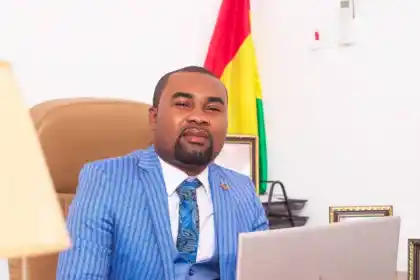Dr. Razak Kojo Opoku, a prominent member of the New Patriotic Party (NPP) and a key strategist for Dr. Bryan Acheampong’s 2028 presidential bid, has launched a pointed critique of former Vice President Dr. Mahamudu Bawumia, accusing him of exhibiting a lack of tolerance towards criticism directed at the NPP’s performance in government. Dr. Opoku’s remarks center on Dr. Bawumia’s perceived inability to accept responsibility for the economic challenges faced during the Akufo-Addo administration, despite his prominent role as the head of the Economic Management Team. This critique underscores a growing internal debate within the NPP regarding accountability for the party’s recent political and economic record, and highlights the emerging fault lines as the party prepares for its next leadership contest. Dr. Opoku’s comments suggest a strategic effort to position Dr. Acheampong as a more accountable and resilient leader compared to Dr. Bawumia.
Dr. Opoku’s central argument revolves around the concept of leadership accountability. He contends that true leadership requires the ability to accept both praise and criticism with equanimity. He accuses Dr. Bawumia of demonstrating a pattern of selectively accepting credit for positive developments while deflecting blame for negative outcomes onto former President Akufo-Addo. This selective approach to accountability, according to Dr. Opoku, undermines Dr. Bawumia’s leadership credentials and raises questions about his willingness to take ownership of difficult situations. He contrasts this with the behavior of past NPP leaders, including President Akufo-Addo himself, who, he claims, endured substantial criticism while remaining receptive to diverse viewpoints.
Dr. Opoku’s assertions highlight a potential vulnerability in Dr. Bawumia’s political image. By portraying him as overly sensitive to criticism, Dr. Opoku attempts to frame him as lacking the resilience and fortitude required for effective leadership, especially in the face of adversity. This narrative seeks to contrast with the image of Dr. Acheampong, implicitly presented as a more robust and steady leader capable of navigating both triumphs and setbacks with greater composure. This strategic messaging aims to resonate with NPP members who may be seeking a leader who can acknowledge past shortcomings and learn from them, rather than deflecting responsibility.
The critique further delves into the nature of collective responsibility in governance. Dr. Opoku argues that the successes and failures of the NPP government were the product of collective decision-making and shared responsibility. He challenges the notion that any single individual, including the former president, should bear the entire burden of blame. By emphasizing the collective nature of governance, he implicitly suggests that Dr. Bawumia’s attempts to distance himself from the government’s shortcomings are disingenuous and an abdication of his role within the collective leadership.
Dr. Opoku’s remarks are particularly noteworthy given their timing, occurring within the context of intensifying competition within the NPP for the party’s presidential nomination in 2028. By publicly criticizing Dr. Bawumia, a prominent contender for the nomination, Dr. Opoku is actively seeking to shape the narrative surrounding the party’s future leadership. His statements serve not merely as a critique of Dr. Bawumia’s leadership style, but also as a strategic maneuver to bolster the standing of Dr. Acheampong, positioning him as a more accountable and resilient alternative.
In concluding his critique, Dr. Opoku calls upon Dr. Bawumia to embrace a more inclusive approach to leadership, one that acknowledges shared responsibility and demonstrates a greater willingness to accept criticism. This call for increased accountability and transparency underscores a broader debate within the NPP about the party’s future direction and leadership choices. It suggests that the upcoming leadership contest within the NPP will likely focus heavily on issues of accountability, resilience, and the ability to learn from past experiences. The public airing of these internal debates offers a glimpse into the evolving dynamics within the party and the potential challenges ahead as it navigates the post-Akufo-Addo era.














